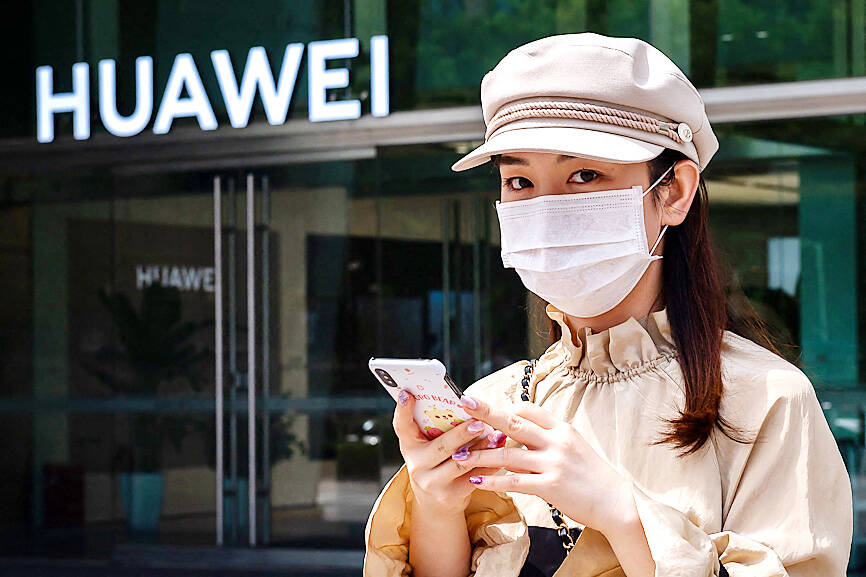The US government has blacklisted Yangtze Memory Technologies Co (長江儲存), Shanghai Micro Electronics Equipment Group Co (上海微電子) and dozens of other Chinese tech companies, ratcheting up a trade conflict between the world’s two largest economies.
The US Department of Commerce placed the companies on its Entity List, meaning that anyone seeking to supply them with US technology would require a license from Washington — something that will likely be difficult to get.
The lineup also includes Pengxinwei IC Manufacturing Co (鵬芯微集成電路). The fledgling chip business is run by a former Huawei Technologies Co (華為) executive and is constructing facilities close to that company’s headquarters, public records and satellite photographs show.

Photo: AFP
Huawei — a company already under strict US sanctions — was expected to buy most, if not all, of the output from that chip factory.
The latest restrictions are part of a push to limit China’s access to advanced chipmaking and artificial intelligence technology, which the US wants to keep away from the Asian nation’s military.
In October, the administration of US President Joe Biden unveiled sweeping measures that limit what US companies can sell to the country — and it has been pushing for allies to go along with the plan.

Photo: AFP
The idea is to severely restrict China’s “ability to leverage artificial intelligence, advanced computing and other powerful, commercially available technologies for military modernization and human rights abuses,” US Undersecretary of Commerce for Industry and Security Alan Estevez said in a statement. “This work will continue, as will our efforts to detect and disrupt Russia’s efforts to obtain necessary items and technologies for its brutal war against Ukraine, including from Iran.”
Yangtze Memory and Shanghai Micro were added to the list out of concern that they would work with companies that the US says pose a risk to national security or support oppression by the Chinese government, including Huawei and Hangzhou Hikvision Digital Technology Co (杭州海康威視).
Yangtze Memory and Shanghai Micro are key to China’s efforts to build a domestic chipmaking industry and wean itself off imports, particularly those from the US.
In all, 36 companies were added to the Entity List in its last overhaul.
ASML RIVAL
Shanghai Micro is China’s leading lithography equipment maker. It is a smaller rival to ASML Holding NV, a Dutch company whose machines are essential to the production of the most advanced chips.
ASML’s technological advantage in that area is currently unmatched by any company anywhere, and the clampdown on Shanghai Micro would make it even less likely that a challenger emerges from China.
Yangtze Memory is a supplier of flash memory chips — the kind of component that stores data in mobile phones and personal computers.
The company was making rapid advances in its production technology, chasing manufacturers such as Samsung Electronics Co, Kioxia Holdings Corp and Micron Technology Inc.
Yangtze Memory had been in talks to supply Apple Inc, which makes virtually all of its iPhones in China. Earlier rules, announced in October, already hurt its access to production machinery. Now the entity listing further hinders its ability to compete.
For Beijing, the export curbs have added pressure to develop a homegrown chipmaking industry. The country has poured tens of billions of US dollars into its domestic capabilities, with mixed results.
Chinese officials are readying a 1 trillion yuan (US$143.5 billion) package to subsidize local chipmakers’ purchase from the nation’s equipment firms, Reuters has reported.
The latest announcement by the US commerce department also expands restrictions on artificial intelligence (AI) technology.
Cambricon Technologies Corp (寒武紀科技) and several of its affiliates, which are developing AI components or systems, were added to the list.

To many, Tatu City on the outskirts of Nairobi looks like a success. The first city entirely built by a private company to be operational in east Africa, with about 25,000 people living and working there, it accounts for about two-thirds of all foreign investment in Kenya. Its low-tax status has attracted more than 100 businesses including Heineken, coffee brand Dormans, and the biggest call-center and cold-chain transport firms in the region. However, to some local politicians, Tatu City has looked more like a target for extortion. A parade of governors have demanded land worth millions of dollars in exchange

Hong Kong authorities ramped up sales of the local dollar as the greenback’s slide threatened the foreign-exchange peg. The Hong Kong Monetary Authority (HKMA) sold a record HK$60.5 billion (US$7.8 billion) of the city’s currency, according to an alert sent on its Bloomberg page yesterday in Asia, after it tested the upper end of its trading band. That added to the HK$56.1 billion of sales versus the greenback since Friday. The rapid intervention signals efforts from the city’s authorities to limit the local currency’s moves within its HK$7.75 to HK$7.85 per US dollar trading band. Heavy sales of the local dollar by

Taiwan Semiconductor Manufacturing Co’s (TSMC, 台積電) revenue jumped 48 percent last month, underscoring how electronics firms scrambled to acquire essential components before global tariffs took effect. The main chipmaker for Apple Inc and Nvidia Corp reported monthly sales of NT$349.6 billion (US$11.6 billion). That compares with the average analysts’ estimate for a 38 percent rise in second-quarter revenue. US President Donald Trump’s trade war is prompting economists to retool GDP forecasts worldwide, casting doubt over the outlook for everything from iPhone demand to computing and datacenter construction. However, TSMC — a barometer for global tech spending given its central role in the

An Indonesian animated movie is smashing regional box office records and could be set for wider success as it prepares to open beyond the Southeast Asian archipelago’s silver screens. Jumbo — a film based on the adventures of main character, Don, a large orphaned Indonesian boy facing bullying at school — last month became the highest-grossing Southeast Asian animated film, raking in more than US$8 million. Released at the end of March to coincide with the Eid holidays after the Islamic fasting month of Ramadan, the movie has hit 8 million ticket sales, the third-highest in Indonesian cinema history, Film